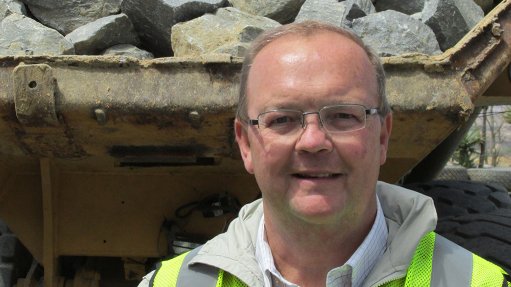
NICO PIENAAR The value of the Mining Indaba will be evaluated and feedback will be given to Aggregate and Sand Producers Association of Southern Africa members
The Aggregate and Sand Producers Association of Southern Africa (Aspasa) will this year send a delegation to the Investing in African Mining Indaba for the first time to evaluate the value of the event for the local aggregate and sand industry.
Aspasa director Nico Pienaar says Aspasa did not attend the indaba in previous years as the event is perceived as an international investors forum which does not offer much value to the local aggregate and sand sector.
“The costs of the indaba for us, as a nonprofit producers association, has always been a hindrance. However, we decided last year that the association would attend the event. The value of the indaba will be evaluated by the Aspasa delegation and feedback will be given to our member companies,” he tells Mining Weekly.
Pienaar says, while the indaba might enable Aspasa to make important contacts with other companies and associations, it is still unclear whether these contacts will be relevant to the aggregate and sand sector.
The Mining Indaba will take place at the Cape Town International Convention Centre from February 9 to 12.
Supporting Local Construction
Meanwhile, Pienaar points out that Aspasa has developed a “close relationship” with the Department of Human Settlements (DHS) and aims to support the building of many homes this year.
“Aspasa, as the representative body of the main building materials used in infrastructure building, namely aggregate and sand, is in full support of the vision of Human Settlements Minister Lindiwe Sisulu,” states Pienaar.
In October, the Minister called on all involved in the housing construction industry to work together to assist government in reaching its goal of building 1.5-million houses within the next five years.
The DHS, at that time, committed to addressing several key issues which hamper closer cooperation and has taken various steps to unite the industry.
These include accelerating the granting of title deeds, working closely with financial institutions to obtain loans for home owners to procure land, establishing a dedicated unit to ensure material supply payments are made on time, as well as an ombudsman office to deal with disputes and creating forums to deal with bottlenecks.
The DHS has also started training young people to build houses and participate in the economy using the Cuban model of youth brigades.
In response to the Minister’s proposal, Aspasa and ready-mix companies representative body the Southern Africa Readymix Association (Sarma), produced a combined list of pledges on behalf of their members.
Pienaar, a director on the boards of both associations, says the associations support the Minister’s initiative, as it enables all South Africans to have a home and uplifts the dignity of the population.
Pienaar adds that the association’s pledges will be achieved with the cooperation of government and other role-players.
The pledges of the associations include striving towards supplying quality aggregate, sand and readymix concrete to DHS projects and working with provincial human settlements departments to reduce payment delays for material supplied by paying companies within an acceptable period of a maximum of 60 days.
Member companies also committed to working with national and provincial departments, as well as municipalities, on issues regarding housing.
Additional pledges include (once payment and issues of transparency within the DHS have been resolved), advising the DHS on plans that are drafted to build more houses, as the industry has spare capacity to supply aggregate, sand and ready-mix; requesting members to report cases of corruption to the ombudsman and the Minister; and requesting members not to become involved in paying bribes or in any form of business that is corrupt.
Further, member companies pledge to attempt to work with the National Home Builders Regulatory Council, thereby ensuring that quality, professionalism and standards are maintained in the housing sector in South Africa; to involve local communities where individuals or nonprofit organisations want to assist individuals in building their own homes with quality materials; and to advise the Minister as part of an industry-led advisory group on issues pertaining to achieving the goal of building houses for disadvantaged South Africans.
Government Support Required
In addition to the pledges, the two associations also raised some concerns.
Aspasa requested that the DHS assist in eradicating the illegal mining of sand and aggregates, while Sarma asked that government ensure that substandard ready-mix concrete, including substandard cement imported into South Africa, not be used on any future government projects.
According to the Mining Charter’s guidelines for social and labour plans, which guide Aspasa members, the quarry industry has to commit to involving local communities in building their own homes.
“A challenge, however, might exist at a municipal level, where a lack of coordination between departments could hamper progress,” notes Pienaar.
He says the training of youth and women in building houses is an issue close to the hearts of all member organisations and that ways have to be found to develop various skills for the improvement of the overall building industry.